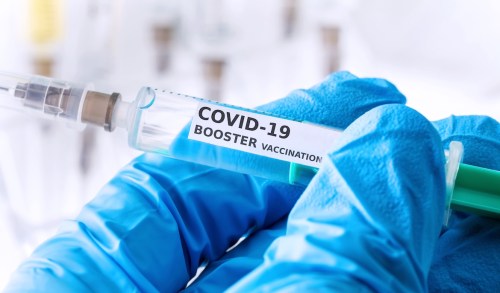Are We Headed Toward Seasonal COVID-19 Booster Shots?
We asked experts to break down the likelihood that we'll eventually encounter seasonal COVID-19 booster shots?

If we’ve learned anything in our two-plus years of pandemic living, it’s that COVID-19 information and recommendations are constantly evolving. As the rates and risks change, we adapt. We’ve navigated vaccine rollouts, booster shots, and new waves, and we’re better prepared today than we were in 2020. Still, with new variants and revised vaccine recommendations, you might wonder if we’re moving closer to a seasonal COVID-19 booster shot.
Experts in This Article
Dr. Otto Yang is a Clinician in the Division of Infectious Diseases at the Department of Medicine at UCLA.
Sherif Mossad, MD, is an infectious disease physician at Cleveland Clinic.
Current guidelines for the second COVID-19 vaccine booster shot
The U.S. Food and Drug Administration (FDA) recently authorized a second COVID-19 vaccine booster dose for people ages 50 and older and immunocompromised individuals ages 12 and over, four months after receiving the first booster. Additionally, if the initial vaccine was two doses of the Johnson & Johnson’s Janssen vaccine at least four months ago, the CDC recommends getting boosted with a messenger RNA (mRNA) vaccine, like Pfizer-BioNTech or Moderna. According to the CDC, mRNA vaccines teach cells how to make a protein that will trigger an immune response inside the body. Second boosters can only be Moderna or Pfizer-BioNTech (and for 12 through 17-year-olds, only Pfizer-BioNTech).
So, there are the guidelines, but the CDC says, even if you qualify, you may consider waiting to get a second booster if you’ve had COVID-19 within the past three months or if you feel that getting a second booster now would make you unlikely to get another booster come autumn. According to the CDC, a second booster may be more critical in the fall of 2022 or if a new vaccine for a future COVID-19 variant becomes available.
Why are COVID-19 booster shots important
“The duration of immunity and need for repeat vaccinations is still being determined, so it’s difficult to define it as a temporary booster or a set booster,” says Otto Yang, MD, Division of Infectious Diseases, Department of Medicine at UCLA.
“Studies have shown that the COVID-19 vaccines are safe and effective and that receiving a booster dose(s) of the vaccine provides stronger protection from severe illness, hospitalization, and death than receiving just the primary series (which may be two or three doses depending on the vaccine and patient-specific criteria),” says Sherif Mossad, MD, an infectious disease physician at Cleveland Clinic. “We encourage everyone eligible to receive their COVID-19 vaccination and to get boosted.”
While new CDC findings suggest that 60 percent of people in the U.S. have been infected with Omicron or another coronavirus variant, the growing portion doesn’t mean that boosters or vaccines are unnecessary. “Since people can be reinfected, there is no possibility for herd immunity,” Dr. Yang says. “Typically, a repeat infection is milder than the first, but that’s no guarantee, and it could be that a new deadlier strain causes a wave at some point.”
It’s also important to protect yourself with a second booster because roughly four months after the first booster, the potency wanes. “It’s not black and white. It’s not that suddenly after four months the vaccine doesn’t do anything. It’s that after four months, its effectiveness starts to steadily decline,” Dr. Yang says.
And, if you’re concerned that additional doses may be counterproductive, Dr. Yang says that’s misinformation. “People are misapplying science principles to raise alarm,” Dr. Yang says. “There is a lot of pushing the thought that getting vaccinated will exhaust your immune system. Exhaustion is a formal term used by immunologists where the immune response against the virus is overstimulated. And it’s not true,” he explains. The mRNA vaccines provide short exposures to the spike protein found on the surface of the virus, Dr. Yang says. People with natural COVID-19 infections have way more of the spike protein in their bodies over a longer time, and they don’t get immune exhaustion, he explains.
So, are seasonal COVID-19 booster shots in our future?
It’s currently unclear if we’re headed toward seasonal COVID boosters, explains Dr. Mossad. “Recent data showing waning immunity suggests that seasonal COVID-19 booster shots may not be sufficient, unless COVID-19 establishes clear seasonal epidemics similar to influenza,” he says. “This virus has shown us time and again that it’s unpredictable and additional waves of infection are possible, so it’s best to gain protection now through vaccination and boosting rather than when another surge comes.”
That said, Dr. Yang says COVID-19 boosters are likely. “The hope is that eventually, it will be figured out how to adjust the vaccines so a booster would be given once a year. We need to see if COVID itself becomes more seasonal,” he says. “The companies are working on ways to adjust the vaccine so they will have a better long-term effect. Hopefully, we will know in a year or two.”
Oh hi! You look like someone who loves free workouts, discounts for cutting-edge wellness brands, and exclusive Well+Good content. Sign up for Well+, our online community of wellness insiders, and unlock your rewards instantly.
Sign Up for Our Daily Newsletter
Get all the latest in wellness, trends, food, fitness, beauty, and more delivered right to your inbox.
Got it, you've been added to our email list.










